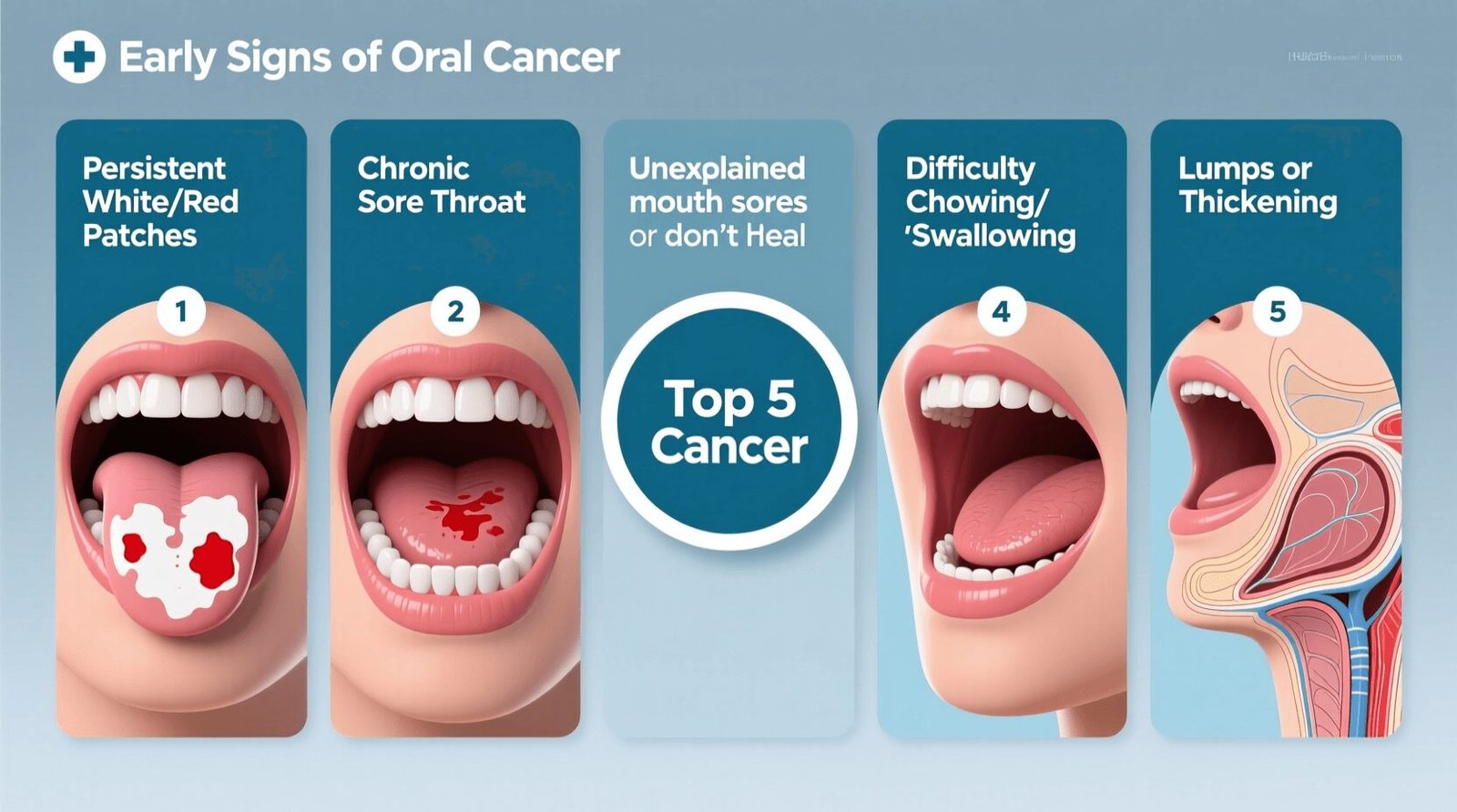Top 5 Early Signs of Oral Cancer to Take Note Of!
Oral cancer doesn’t usually show up overnight. The body gives few warnings, and many people miss them. If you catch these early signs of oral cancer, you have a much better chance of treating it quickly. And if you’re in Dubai, the best dentist in Deira can help you spot these symptoms before they turn serious.
I’m not saying you should panic over every sore spot or tiny bump in your mouth. But ignoring changes is risky. Your mouth is one of the easiest areas for cancer to be detected early—if you’re paying attention.
Why spotting oral cancer early matters
- Early treatment is less invasive.
- Survival rates go up significantly.
- You save yourself a lot of pain and money down the road.
Oral cancer can affect your lips, tongue, gums, inner cheeks, or even the roof of your mouth. Sometimes the symptoms seem harmless, like a simple ulcer. That’s where people often brush it off.
The truth? A lot of cases are caught late because people assume it’s “just nothing.”
The top 5 early signs of oral cancer
1. Persistent mouth sores
Almost everyone gets mouth ulcers at some point. Usually, they heal within 10–14 days. If you notice a sore that just won’t heal, it could be a red flag.
- Check how long it has been there.
- If it’s painful or bleeds easily, get it looked at.
- Don’t wait more than two weeks before visiting a dentist.
I once ignored a mouth sore for a month because I thought it was from biting my cheek. It healed eventually, but it made me realize how easily I could have missed something serious.
2. Red or white patches inside the mouth
Not all patches are cancer, but some can turn into it. These spots often appear on the tongue or gums. They don’t usually hurt, so people forget about them.
- White patches are called leukoplakia.
- Red patches are called erythroplakia.
- Mixed ones are considered higher risk.
If you notice any patches that don’t clear up, the best dentist in Deira can examine them and decide if you need a biopsy.
3. Unexplained bleeding
Bleeding gums are common if you have gum disease, but random bleeding without brushing or flossing? That’s different.
- Look out for blood when eating soft foods.
- Pay attention if it happens without any clear cause.
Unexplained bleeding is often ignored, yet it’s one of the earliest indicators of oral problems, including cancer.
4. Lumps, thickening, or swelling
Run your tongue along your gums and cheeks. Do you feel anything unusual? Oral cancer sometimes shows up as a lump or a thickened patch inside the mouth.
- It can be painless at first.
- Might make dentures or teeth feel uncomfortable.
- It could interfere with chewing or swallowing.
A family friend discovered a lump under her tongue. She thought it was nothing. Turned out it needed immediate attention. That moment made me take these signs way more seriously.
5. Changes in voice or difficulty swallowing
If your voice sounds hoarse or you find it hard to swallow, it may not always be a throat infection. Sometimes, oral cancer develops deeper in the mouth or near the throat.
- Food feeling stuck often signals a problem.
- Pain when speaking or swallowing shouldn’t be ignored.
These symptoms usually show up later than sores or patches, but catching them early still matters.
Who is at higher risk?
Oral cancer doesn’t discriminate, but certain habits and conditions raise your chances.
- Smoking or chewing tobacco
- Heavy alcohol use
- HPV infection
- Poor oral hygiene
- Family history of cancer
- Long-term sun exposure (for lip cancer)
Even if you don’t smoke or drink, you should still watch for the early signs of oral cancer. Genetics and lifestyle both play a role.
When should you visit a dentist?
Honestly, any time you notice changes that don’t heal in two weeks. Don’t wait for it to get worse. If you live in Dubai, booking a checkup with the best dentist in Deira could make all the difference.
A dentist can do a proper exam, use special lights, and decide if you need further tests. It’s quick, and it could save your life.
Practical steps you can take
- Check your mouth in the mirror once a month.
- Note any sores, patches, or lumps.
- Take photos if you want to compare over time.
- Don’t ignore persistent pain or bleeding.
- Get professional cleanings twice a year.
And yes, lifestyle changes help too. Cutting down on tobacco and alcohol lowers your risk dramatically.
FAQs about early signs of oral cancer
1. What are the first early signs of oral cancer?
The first signs are usually persistent sores, red or white patches, or lumps inside the mouth. These don’t heal within two weeks and may bleed easily.
2. How do I know if a mouth ulcer is cancer?
If an ulcer doesn’t heal in two weeks, feels painful, or keeps coming back, get it checked. The best dentist in Deira can help identify if it’s harmless or needs further testing.
3. Can oral cancer be cured if caught early?
Yes. Treatment success rates are much higher when detected early. Surgery, radiation, or other treatments can remove cancer before it spreads.
4. Does oral cancer hurt at the beginning?
Not always. Some signs, like patches or small lumps, may be painless at first, which is why many people delay seeing a dentist.
5. Who should get screened for oral cancer?
Anyone over 40, especially smokers and drinkers, should get screened. But even younger people with risk factors like HPV or family history should pay attention.
Oral cancer isn’t something you can spot without paying attention. The early signs of oral cancer are often small sores, patches, bleeding, lumps, or voice changes. Simple stuff that’s easy to overlook.
Your mouth gives you signals. You just need to listen.
And if you’re in Dubai, visiting the best dentist in Deira can give you peace of mind. Regular checkups and quick action on any suspicious changes could be the difference between a minor treatment and a life-threatening illness.
Take your oral health seriously. It’s not just about teeth—it’s about your overall health.







